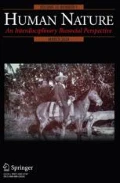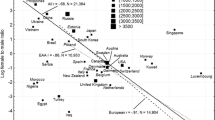Abstract
Empirical tests described in this article support hypotheses derived from evolutionary theory on the perceptions of literary characters. The proper and dark heroes in British Romantic literature of the late eighteenth and early nineteenth centuries respectively represent long-term and short-term mating strategies. Recent studies indicate that for long-term relationships, women seek partners with the ability and willingness to sustain paternal investment in extended relationships. For short-term relationships, women choose partners whose features indicate high genetic quality. In hypothetical scenarios, females preferred proper heroes for long-term relationships. The shorter the relationship under consideration, the more likely women were to choose dark heroes as partners.
Similar content being viewed by others
References
Alexander, Richard, John L. Hoogland, Richard D. Howard, Katharine M. Noonan, and Paul W. Sherman 1979 Sexual Dimorphisms and Breeding Systems in Pinnipeds, Ungulates, Primates, and Humans. In Evolutionary Biology and Human Social Behavior: An Anthropological Perspective, Napoleon Chagnon and William Irons, eds. Pp. 402–435. North Scituate, Massachusetts: Duxbury.
Ardener, Edwin 1960 Plantation and Village in the Cameroons. London: Oxford University Press.
Barash, David P., and Judith Eve Lipton 2001 The Myth of Monogamy: Fidelity and Infidelity in Animals and People. New York: Freeman.
Buss, David M. 1994 The Evolution of Desire: Strategies of Human Mating. New York: Basic Books.
2000 The Dangerous Passion: Why Jealousy Is as Necessary as Love and Sex. New York: Free Press.
Carroll, Joseph. 1995 Evolution and Literary Theory. Columbia: University of Missouri Press.
Cashdan, Elizabeth 1996 Women’s Mating Strategies. Evolutionary Anthropology 5:134–143.
Cohen, Jacob 1988 Statistical Power Analysis for the Behavioral Sciences, second ed. New York: Academic Press.
Dawkins, Richard 1976 The Selfish Gene. Oxford: Oxford University Press.
Draper, Patricia 1989 African Marriage Systems: Perspectives from Evolutionary Ecology. Ethology and Sociobiology 10:145–169.
Draper, Patricia, and Jay Belsky 1990 Personality Development in Evolutionary Perspective. Journal of Personality 58:141–161.
Draper, Patricia, and Henry Harpending 1982 Father Absence and Reproductive Strategy: An Evolutionary Perspective. Journal of Anthropological Research 38:252–273.
1988 A Sociobiological Perspective on the Development of Human Reproductive Strategies. In Sociobiological Perspectives on Human Development, Kevin B. MacDonald ed. Pp. 340–372. New York: Springer.
Farrell, John P. 1980 Revolution as Tragedy: The Dilemma of the Moderate from Scott to Arnold. Ithaca, New York: Cornell University Press.
Gangestad, Steven W., and Jeffry A. Simpson 2000 The Evolution of Human Mating: Trade-offs and Strategic Pluralism. Brain and Behavioral Sciences 23:573–644.
Geary, David 1998 Male, Female: The Evolution of Human Sex Differences. Washington D.C.: American Psychological Association.
Hazlitt, William 1930 Why the Heroes of Romances Are Insipid. In The Complete Works of William Hazlitt, Vol. 17. P. P. Howe, ed. Pp. 246–254. London: Dent.
Hill, Kim, and A. Magdelena Hurtado 1996 Ache Life History: The Ecology and Demography of Foraging People. Hawthorne, New York: Aldine de Gruyter.
Jobling, Ian 2002a Byron as Cad. Philosophy and Literature 26:296–311.
2002b Testosterone and Romanticism. Submitted for publication in The Wellsprings of the Arts: Biology, Chaos and Popular Culture, Brett Cooke and Frederick Turner, eds.
2002c The Emergence of the Dark Hero in Scott and Byron: A Darwinian Perspective. Ph.D. Thesis, Comparative Literature Department, SUNY Buffalo.
Kelly, Susan, and Robin I. M. Dunbar 2001 "Who Dares, Wins": Heroism versus Altruism in Women’s Mate Choice. Human Nature 12:89–105.
Lancaster, Jane B., and Hillard Kaplan 1992 Human Mating and Family Formation Strategies: The Effects of Variability Among Males in Quality and the Allocation of Mating Effort and Parental Investment. In Topics in Primatology, Volume 1: Human Origins. Toshisada Nishida, ed. Pp. 21–33. New York: Springer.
Maclay, George, and Humphry Knipe 1972 The Dominant Man: The Pecking Order in Human Society. New York: Delacorte.
Mazur, Allan, Carolyn Halpern, and J. Richard Udry 1994 Dominant Looking Male Teenagers Copulate Earlier. Ethology and Sociobilogy 15:87–94.
Pinker, Steven 1997 How the Mind Works. New York: Norton.
2002 The Blank Slate: The Modern Denial of Human Nature. New York: Viking.
Radcliffe, Ann 1998 The Mysteries of Udolpho. [Originally published in 1794]. Oxford: Oxford University Press.
Railo, Eino 1927 The Haunted Castle: A Study of the Elements of English Romanticism. London: Routledge, and New York: Dutton.
Sadalla, Edward K., Douglas T. Kenrick, and Beth Vershure 1987 Dominance and Heterosexual Attraction. Journal of Personality and Social Psychology 52:730–738.
Scott, Sir Walter 1900 The Pirate. [Originally published in 1822]. New York: Funk and Wagnalls.
1969 The Heart of Mid-Lothian. [Originally published in 1818]. New York: Holt.
1986 Waverley. [Originally published in 1814]. Oxford: Oxford University Press.
Thorslev, Peter L., Jr. 1962 The Byronic Hero: Types and Prototypes. Minneapolis: University of Minnesota Press.
Toothaker, Larry E. 1993 Multiple Comparison Procedures. Newbury Park, California: Sage.
Townsend, John M. 1989 Mate Selection Criteria: A Pilot Study. Ethology and Sociology 10:173–206.
Trivers, Robert 1985 Social Evolution. Menlo Park, California: Benjamin Cummings.
Welsh, Alexander 1992 The Hero of the Waverley Novels, with New Essays on Scott. Princeton, New Jersey: Princeton University Press.
Wiederman, Michael W., and Elizabeth R. Allgeier 1992 Gender Differences in Mate Selection Criteria: Sociobiological or Socioeconomic Explanation? Ethology and Sociobiology 13:115–124.
Wilson, Edward O. 1998 Consilience: The Unity of Knowledge. New York: Random House.
Author information
Authors and Affiliations
Corresponding author
Additional information
Daniel J. Kruger earned his Ph.D. in social psychology at Loyola University Chicago. He is currently a research fellow at the Institute for Social Research at the University of Michigan. His evolutionary research interests include altruism, cooperation, competition, risk, life history, mortality patterns, and applications for social and ecological sustainability.
Maryanne Fisher is a Ph.D. candidate in the Department of Psychology at York University in Toronto, Canada. Her dissertation research focuses on the evolutionary underpinnings of female intrasexual competition for the purposes of female mate selection.
Ian Jobling received his Ph.D. in comparative literature from SUNY Buffalo in September 2002. His dissertation discusses the figures of the proper and dark heroes in the works of Scott and Byron from an evolutionary perspective.
Rights and permissions
About this article
Cite this article
Kruger, D.J., Fisher, M. & Jobling, I. Proper and dark heroes as DADS and CADS. Hum Nat 14, 305–317 (2003). https://doi.org/10.1007/s12110-003-1008-y
Received:
Revised:
Issue Date:
DOI: https://doi.org/10.1007/s12110-003-1008-y




